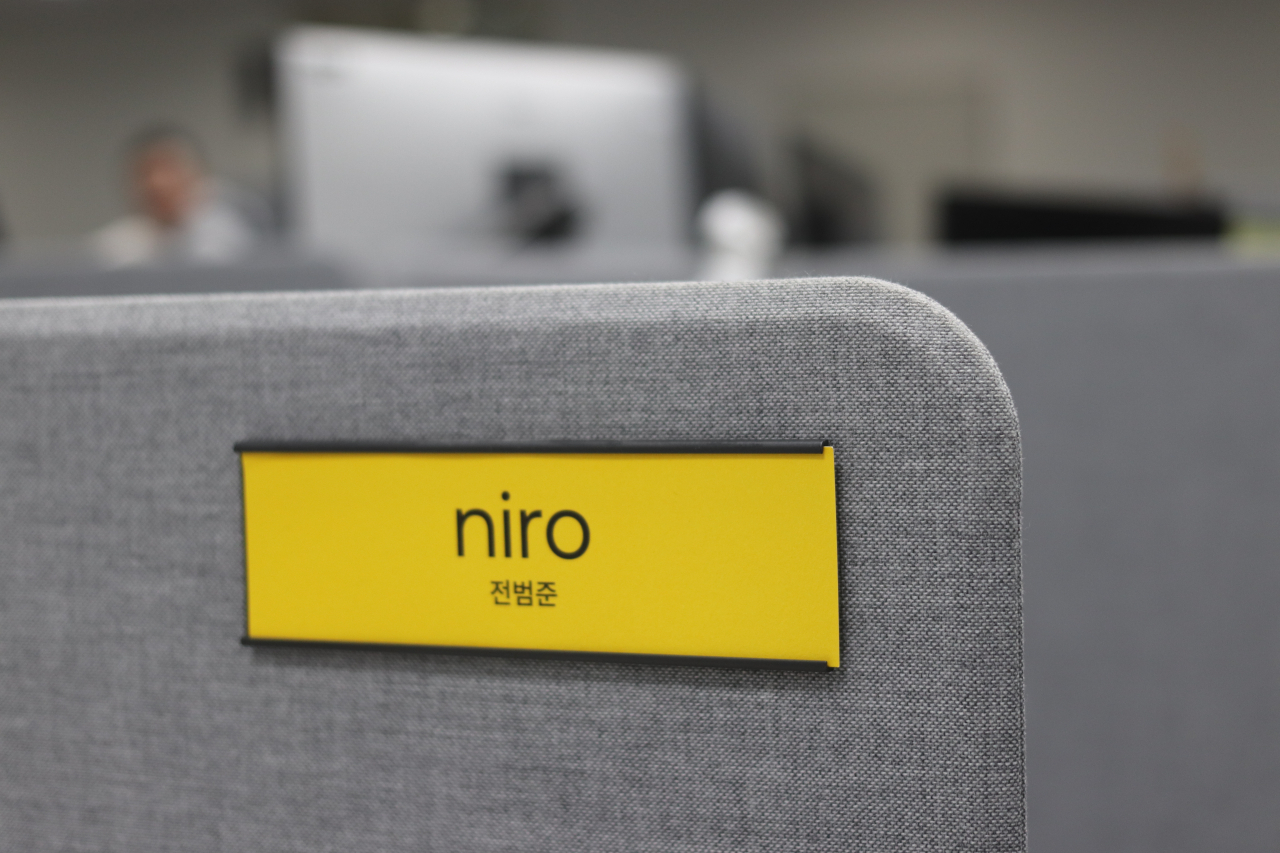 |
More and more Korean firms adopt English name policies, dispensing with Korean names and traditional position titles while at work. This trend began and has continued since 2010.(123rf) |
A team led by Andrew, comprising James, Chris and Lisa, engages in lively conversations about work while addressing each other by their first names.
This atmosphere is something that some Korean companies are trying to emulate by mandating all employees to use their preferred English name while at work.
The rationale is that they need to move away from the Korean language’s emphasis on honorifics, position titles and other formalities, to facilitate horizontal communication. The thinking is that, by ditching Korean names and the complex honorifics system attached to them in the Korean language, employees should be able to engage in more open and effective communication, encouraging innovation.
But does it actually work?
Predictable resistance
As one can imagine, not all employees welcome mandatory name-change policies with open arms.
At Kyobo Life Insurance, skepticism hangs over the company's four-month-old English-name policy.
"It's ridiculous," said one employee who requested anonymity.
"Communication hasn't improved, and some colleagues can't even pronounce the English names, so we've had to post Korean pronunciations next to them on our company's intranet."
Implemented in August, the policy aims to infuse a energetic, flexible and innovative spirit into the 65-year-old life insurer, as it strives to cope with the increasing competition from fintech startups. But some employees remain unconvinced.
A Kyobo Life Insurance spokesperson told The Korea Herald that English names were being widely used, but another employee said it was rare: "The company plays a song daily encouraging English names, but I've never heard anyone use them, besides those in the HR department."
A former employee at Line Friends, the character business spin-off from messenger app Line, shared an anecdote with The Korea Herald that raised questions about the purpose of the English name policy.
"I had been using James as my English name," recounted the worker, who asked to be identified only by his surname of Kim. "So, I attempted to use it as my English name at work. However, my team leader suggested I choose a different name."
The reason was that the company's CEO was already using the name of James.
Unable to object, Kim settled for "David," a name that didn't quite resonate with him. Shortly thereafter, the company scrapped its mandatory English name policy.
Kim noted the irony: A policy meant to dismantle hierarchies ultimately emphasized the existing power structures within the company.
‘Tony' in charge
Typically, the decision to go for English names comes from the very top of a hierarchy -- bosses interested in promoting more open, horizontal communication.
Chey Tae-won, chairman of South Korea’s second-largest business group, SK Group, famously told employees to address him as "Tony" instead of "Mr. Chairman" (in Korean) during a meeting with employees of the group's flagship unit, SK Telecom, in March last year.
Similarly, Samsung Electronics Vice Chairman Han Jong-hee and President Kyung Kye-hyun have told employees to call them just by their English initials, JH and KH, without mentioning their position titles.
Taking a cue from the two towering conglomerates, many other Korean companies thereafter officially adopted English-name policies.
Business administration professor Suh Yong-gu of Sookmyung Women's University says it is one of the easiest choices for Korean firms to make, when trying to reduce the layers of hierarchy still prevalent in many companies here.
"Global business experts commonly advise limiting hierarchies to no more than four layers. They say that communication within a company becomes difficult when there are more than four levels," Suh said.
Suh further explained that the common Korean practice of addressing someone by their title, instead of by their name, creates barriers to reducing hierarchies when employees are faced with suddenly addressing their superiors by their Korean names. He said using English names could offer a less awkward alternative.
Also, Suh noted that the growing trend of "servitization," where manufacturing companies offer along with their products related services requiring ongoing interaction with consumers, necessitates a flatter corporate structure for a wider range of companies. This is because servitization requires shifting towards continuous innovation and a more collaborative approach over the long term, he added.
"The rationale is straightforward," Suh explained. "Companies are evolving to maximize revenue, and adopting English names can be instrumental in achieving this goal."
The growing preference among young workers for horizontal communication has also contributed to the adoption of English names at work here.
A survey conducted by the Federation of Korean Industries in April found that 77.9 percent of millennials and Generation Z respondents prefer a "communicative" leadership style. A total of 827 young workers participated in this survey.
 |
An employee's English name, Niro, is displayed at his desk at Kakao Bank, the internet-only bank unit of IT giant Kakao. (Kakao Bank) |
Success factors
Although Korean IT giant Kakao founder Kim Beom-soo announced Monday, "Kakao will review everything that we took for granted, including the English names," in response to recent challenges arising from stock manipulation allegations against the company, Kakao is still recognized as one of the earliest and most successful adopters of an English-name policy in Korea.
Since its establishment in 2010, the IT company has tried to foster a culture where employees, including executives and even the CEO, use English names.
A Kakao spokesperson acknowledged that adopting English names can feel awkward for many Korean employees initially and requires time to adjust. She also emphasized that simply eliminating job titles and adopting English names is not enough on its own. It needs to be accompanied by efforts to change Korea's rigid, hierarchical corporate culture.
Kakao's employee demographic being relatively young is also seen as a key factor in the successful integration of English names, according to Kakao.
“Kakao employees, on average, are in their mid-30s,” the spokesperson added.
Positive experiences have also surfaced at Korean streaming startup Watcha, where the use of English names has fostered a more open exchange of ideas during brainstorming sessions.
Kim Ki-woong, former assistant director of Watcha's original content-creating team, discovered that employing English names facilitated a more uninhibited discussion of ideas during brainstorming sessions. At work, Kim went by the English name Rogan.
"We could openly express our opinions. For example, we could say 'Nick's (the head producer) idea isn't as compelling, and I prefer Ari's (the head writer) suggestion,'" Kim said.
Some even claim that the policy helps them disconnect when leaving their office, protecting their personal life and thereby providing stronger work-life balance.
“It is like an alter-ego. Some at work do not even know each other’s real names. Some young employees prefer this,” Baek Yo-sun, an employee at local startup The Ventures’ HR team, said.
Food giant CJ CheilJedang said English names are also crucial for employees dealing with overseas business.
“Many employees who have been doing business abroad were already using English names,” the food company’s spokesperson said.
While CJ CheilJedang does not impose the mandatory use of English names, it strongly encourages their adoption, especially given the substantial portion of their workforce involved in international collaborations.
Among its 37,000 employees globally, approximately 26,000 are workers of foreign nationality, according to the company. Additionally, the company has transitioned the names of its teams to English.







![[Herald Interview] How Gopizza got big in India](http://res.heraldm.com/phpwas/restmb_idxmake.php?idx=644&simg=/content/image/2024/11/20/20241120050057_0.jpg)